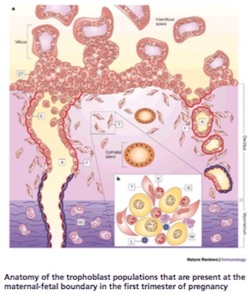Failures of immunological maternal-fetal interactions cause major problems in pregnancy, including recurrent miscarriage, stillbirth, pre-eclampsia and low birth weight. Babies who have poor growth in utero have long term health problems extending into adult life. Professor Ashley Moffett has led research that looks at how the maternal uterine immune system regulates the process of placentation – when the placenta implants into the womb to access the maternal blood supply with maternal oxygen and nutrients.
Immunological maternal-fetal interface

During placentation a territorial boundary is defined between two individuals, the mother and her fetus, and this boundary needs to be in the right place. If the placenta (fetus) is too intrusive, the mother is at risk of uterine rupture and death. If invasion is not deep enough, then the arteries are not sufficiently transformed and the blood flow to placenta is reduced. The fetus will then not grow successfully in utero, and the mother is at risk of developing pre-eclampsia. As many as 3–10% of births worldwide are affected by pre-eclampsia, a complication that is particularly common in first pregnancies. Ashley and her group have been studying how the local uterine immune system may operate to subtly define the interface between mother and baby.
The Moffett lab has typed the KIR genes in women with pre- eclampsia and compared them with those of mothers with normal pregnancies. Results show that particular combinations of maternal KIR genes and fetal MHC genes are associated with pre-eclamptic pregnancies. Similar findings were found in women with repeated early miscarriages where the placenta fails to establish proper connections with the uterine arteries early in gestation.
Partnership with Mulago National Referral and Teaching Hospital and Makerere University
Ashley Moffett is instrumental in developing multiple current and potential future research links between Cambridge and Makerere University, Mulago Hospital and UVRI, in Uganda. She is currently leading a study on the common variants of KIR and HLA genes in case/control studies of pre-eclampsia at Mulago Hospital with Makerere collaborators.
On-going research on cardiovascular disease risk in women with pre-eclampsia is led by Dr Carmel McEniery, Department of Experimental Medicine and Immunotherapeutics at University of Cambridge and Makerere/Mulago collaborators. The work supports full cardiovascular haemodynamic assessment, using the non-invasive Vicorder device. The cardiovascular techniques have been robustly tested on pregnant women by Dr McEniery at the University of Cambridge. The research will provide a platform for extensive collaborations on a wide range of pregnancy complications with risk of cardiovascular disease. The broader aim is cohort recruitment of women pre-pregnancy for follow-up.
In partnerships with the UK charity Cambridge Global Health Partnerships (formerly Addenbrooke's Abroad), obstetricians, midwives and anaesthetists from the Rosie Maternity Hospital, have visited and worked with Mulago colleagues to adapt clinical guidelines for use in Mulago Hospital. In 2015, obstetricians from the Rosie Matnerity Hospital in Cambridge, Drs Jane MacDougall and Charlotte Patient, with Prof Moffett, established a partnership focused on the four major causes of maternal mortality: sepsis, pre-eclampsia, haemorrhage and obstructed labour. A senior clinical, administrative and management team from Mulago Hospital/Makerere University visited Cambridge in 2015 for wide ranging discussions to develop Maternal and Neonatal Health research and clinical care in Kampala. More recently, Addenbrooke’s Hospital volunteer staff (3 consultant Obstetrician/Gynaecologists, one consultant anaesthetist, an academic Clinician and three midwives) visited Mulago for a week to provide lectures, workshops and skills drills (emergency response training) related to guideline development, to some 40-50 local staff daily, including obstetricians, midwives and students. Prof Moffett is working with Ugandan and Cambridge obstetricians (Addenbrooke’s Abroad) to compile the first textbook dedicated to African obstetrics, which will be published by Cambridge University Press.
Key Publications
2. Nakimuli A, Chazara O, Farrell L, Nemat-Gorgani N, Norman PJ, Tukwasibwe S, Jayaraman J, Traherne JA, Lougee E, Vaughan RW, Elliott AM, Byamugisha J, Kaleebu P, Mirembe F, Parham P, Hiby SE, Moffett A. (2015)
A KIR B centromeric region found in Africans but not Europeans is protective against pre-eclampsia.
PNAS doi: 10.1073/pnas.1413453112
3. Moffett A, Shreeve N. (2015) First do no harm: uterine natural killer (NK) cells in assisted reproduction.
Human Reproduction May 7 pii: dev098. [Epub ahead of print]
4. Hiby SE, Apps R, Chazara O, Farrell LE, Magnus P, Trogstad L, Gjessing HK, Carrington M, Moffett A. (2014)
Maternal KIR in Combination with Paternal HLA-C2 Regulate Human Birth Weight.
J Immunol. Jun 1;192(11):5069-73. doi: 10.4049/jimmunol.1400577. PMID: 24778445
5. Nakimuli A, Elliott AM, Kaleebu P, Moffett A, Mirembe F. (2013) Hypertension persisting after pre-eclampsia: a prospective cohort study at Mulago Hospital, Uganda. PLoS One. Dec 31;8(12):e85273. PMID: 24392003
5. Xiong S, Sharkey AM, Kennedy PR, Gardner L, Farrell LE, Chazara O, Bauer J, Hiby SE, Colucci F, Moffett A (2013)
Maternal uterine NK cell–activating receptor KIR2DS1 enhances placentation Journal of Clinical Investigation. doi:10.1172/JCI68991.
7. Parham P, Moffett A (2013) Variable NK cell receptors and their MHC class I ligands in immunity, reproduction and human evolution. Nat Rev Immunol 13:133.
Related links
Immune interaction optimises foetal nourishment during pregnancy
Natural killer cells – a vital part of the immune system
Under pressure: the battle to have a baby in Africa
Miniature ‘womb lining’ grown in lab could reveal secrets of menstrual cycle and early pregnancy
The Centre for Trophoblast Research is a leading Centre of scientific study of the placenta and maternal-fetal interactions during pregnancy.
Cambridge Global Health Partnerships is a charitable trust based at the hospital established in recognition that engaging University staff and clinicians with global health has benefits for patients and health care workers both overseas and in the UK.

